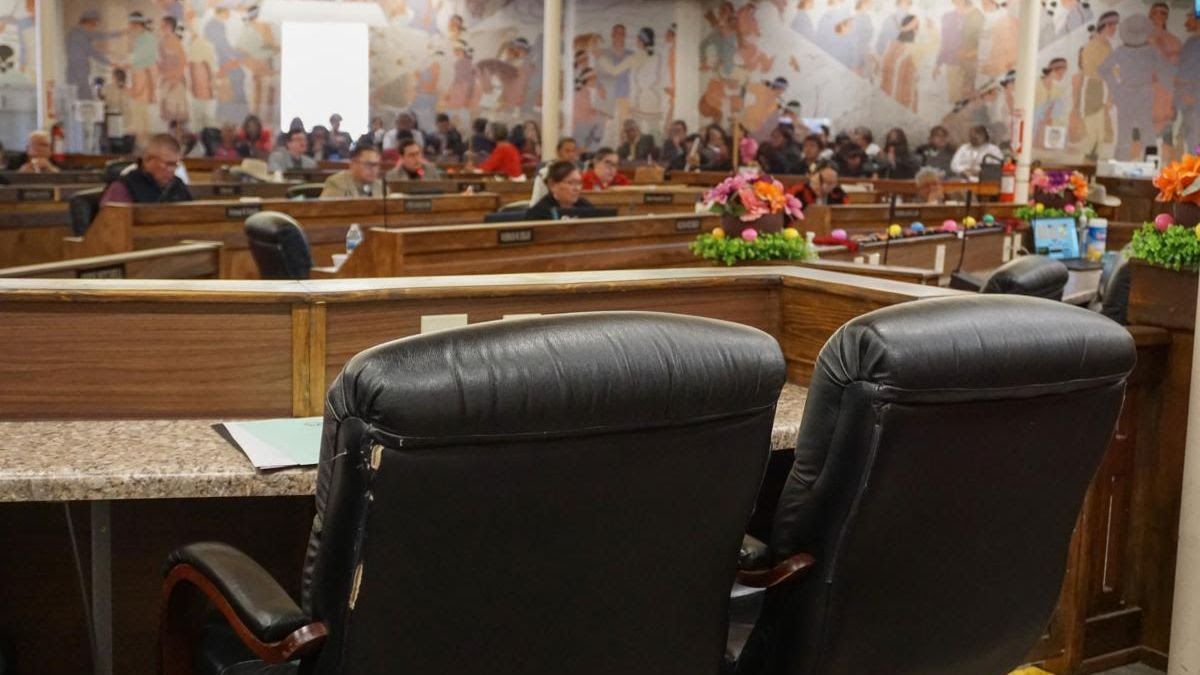
- Details
- By Native News Online Staff
For the fourth time since taking office, Navajo Nation President Buu Nygren did not appear to deliver the State of the Navajo Nation Address on the opening day of the Spring Council Session, held Monday.
According to Navajo Nation law, under 2 N.N.C. §1005 (C)(5), the President is required to “report quarterly to the Navajo Nation Council on the state of the Navajo Nation.”
Ahead of the session, Speaker Crystalyne Curley issued a subpoena ordering President Nygren to appear before the Council to fulfill this obligation and report directly to the Navajo people.
In his absence, the Office of the President and Vice President submitted a written report to the Council. The office stated that President Nygren is currently traveling in Washington, D.C., and referenced recent Executive Orders signed by President Donald Trump.
In his written report, President Nygren stated, “I must and will work with any administration — Republican or Democrat — to protect jobs, preserve and increase revenue for our communities, and expand new opportunities for our Nation.”
Speaker Curley said that working with the Nation’s federal partners is important, but the President also has an obligation to report to the Navajo people and engage in meaningful dialogue with the Council members.
“What we’re seeing from President Nygren is a lot of one way communication directed at the Navajo people through radio, livestreams, newsletters, social media, and now a written report. The Navajo people want to hear President Nygren present his report in person and to have an in depth dialogue with the Council,” said Speaker Curley. “Yes, it’s important to work with our federal partners, but President Nygren also needs work with our Diné leaders as he promised when he campaigned for the presidency.”
Several delegates also raised the possibility of administrative leave, citing repeated absences, unilateral decision-making, and alleged misrepresentations made to both federal partners and the Council.
“We’ve been patient and willing to work with him,” said Delegate Brenda Jesus. “But enough is enough. At what point does the Navajo Nation Council show that we mean business? He’s not honoring our collaboration—he’s mocking it.”
Council Delegate Vince James said the president’s absence was not just disappointing, it was disrespectful to the Navajo people. “President Nygren is playing games with this body and with our Nation. He’s been scheduling meetings in Washington, D.C. to deliberately avoid his responsibility to report to the Council. His actions are undermining our programs and our sovereignty,” said Delegate James.
Council Delegate Dr. Andy Nez echoed widespread concerns about the administration’s lack of transparency and direct engagement with both the Council and the Navajo people.
“The President’s absence sends the wrong message,” said Dr. Nez. “We cleared our schedules to be here. His staff know when the Council meets. He chooses public appearances and media over direct dialogue with this body. It’s time we consider a special session to address this ongoing pattern.”
The 25th Navajo Nation Council voted against receiving President Nygren’s State of the Nation Address as a written report with a vote of one in favor and 20 opposed.
More Stories Like This
Native News Weekly (August 25, 2024): D.C. BriefsUS Presidents in Their Own Words Concerning American Indians
Federal Court Dismisses Challenge to NY Indigenous Mascot Ban
Sen. Angus King Warns of ‘Whitewashing’ History in National Parks Under Trump Administration
Final Call for Donations as CRYP’s 2025 Toy Drive Nears the Finish Line
Help us defend tribal sovereignty.
At Native News Online, our mission is rooted in telling the stories that strengthen sovereignty and uplift Indigenous voices — not just at year’s end, but every single day.
Because of your generosity last year, we were able to keep our reporters on the ground in tribal communities, at national gatherings and in the halls of Congress — covering the issues that matter most to Indian Country: sovereignty, culture, education, health and economic opportunity.
That support sustained us through a tough year in 2025. Now, as we look to the year ahead, we need your help right now to ensure warrior journalism remains strong — reporting that defends tribal sovereignty, amplifies Native truth, and holds power accountable.
 The stakes couldn't be higher. Your support keeps Native voices heard, Native stories told and Native sovereignty defended.
The stakes couldn't be higher. Your support keeps Native voices heard, Native stories told and Native sovereignty defended.
Stand with Warrior Journalism today.
Levi Rickert (Potawatomi), Editor & Publisher


